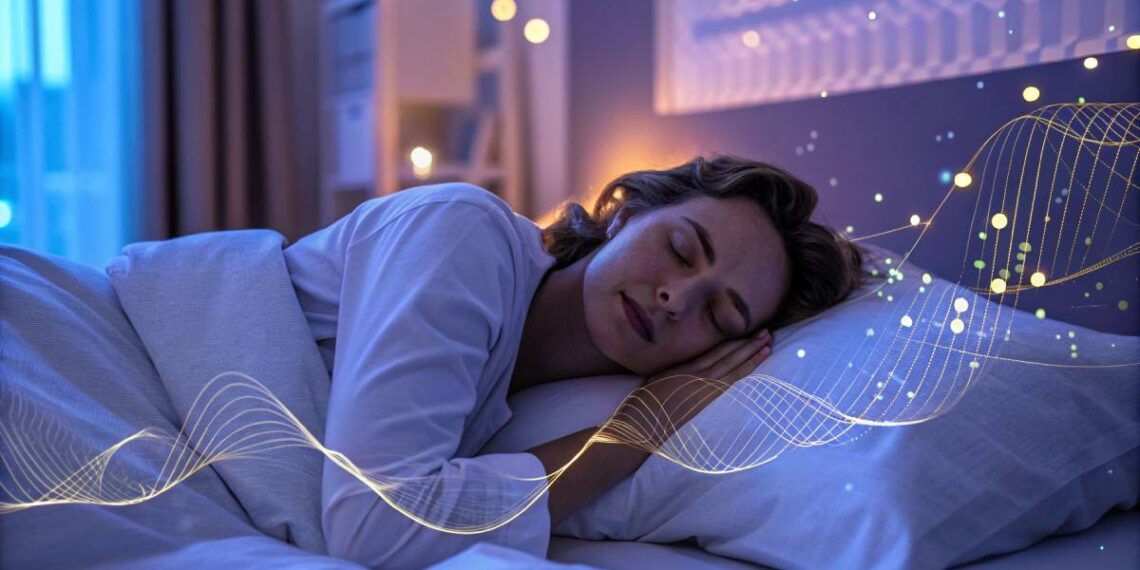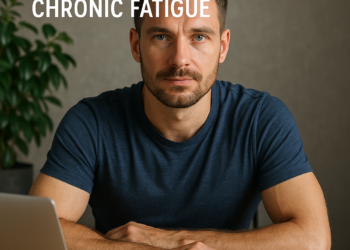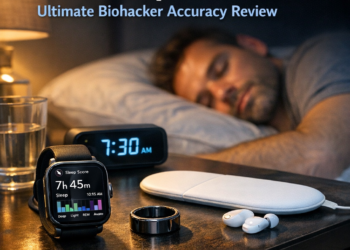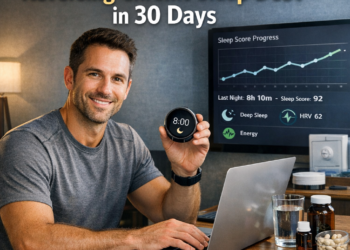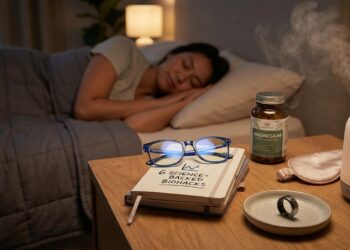In a world dominated by digital distractions, quality sleep has become an elusive treasure. Enter AI sleep optimization—a revolutionary blend of artificial intelligence and sleep science that’s transforming how we approach bedtime. From personalized sleep recommendations to real-time environment adjustments, this technology analyzes your unique sleep patterns and delivers tailored solutions for your best night’s rest. Whether you’re a tech enthusiast, busy parent, overworked professional, or fitness buff—AI sleep tech provides customized pathways to more restorative sleep and enhanced daytime performance.
Key Takeaways
- AI sleep optimization uses artificial intelligence to analyze personal sleep data and provide customized recommendations for better rest
- Technology can both disrupt and improve sleep quality, with AI serving as a bridge between digital habits and healthy sleep
- Sleep tracking through wearables, apps, and home devices provides comprehensive insights into sleep duration, stages, and disruptions
- Different demographic groups benefit uniquely from AI sleep solutions, from tech enthusiasts to parents, professionals, and those with sleep disorders
- Adaptive AI adjustments can modify sleep environments in real-time, including lighting, temperature, and sound to optimize sleep conditions
- Most Americans are not meeting recommended sleep duration guidelines, making technological interventions increasingly important
- Personalized sleep plans outperform generic sleep advice by addressing individual sleep patterns and habits
The Intersection of Technology and Sleep Health
Importance of Sleep Health in the Digital Age
The need for quality sleep is more pressing than ever. No matter if you’re a tech junkie, a busy parent, a 9-to-5 warrior, or a gym rat, restful sleep is your secret weapon. Yet, the constant buzz of phones, tablets, and TVs can throw your slumber all out of whack.
| Age Group | Recommended Sleep (Hours) | Average Sleep (Hours) |
|---|---|---|
| Teens (14-17) | 8-10 | 6-7 |
| Adults (18-64) | 7-9 | 6-8 |
| Seniors (65+) | 7-8 | 5-7 |
These numbers lay it all out. Loads of us aren’t hitting those sleep goals, thanks to endless scrolling and late-night binge-watching. If you’re yawning through the day, it’s about time to rethink how you snooze.
“AI-powered sleep technology represents the most significant advancement in sleep medicine since the discovery of REM sleep. It’s transforming how we understand and optimize individual sleep patterns.” — Dr. Matthew Walker, Neuroscientist and Sleep Expert
Role of Technology in Improving Sleep Quality
Sure, tech might mess with your sleep, but it can also come to the rescue when used right. Enter AI sleep optimization—your new nighttime best friend. By munching on your sleep data, AI figures out what makes you tick, helping to shift your bedroom into nap heaven.
These smart gizmos spit out advice custom-made for your sleep habits. Think smart alarm clocks that nudge you awake ever so gently or circadian lighting that matches your lighting with your body’s rhythm.
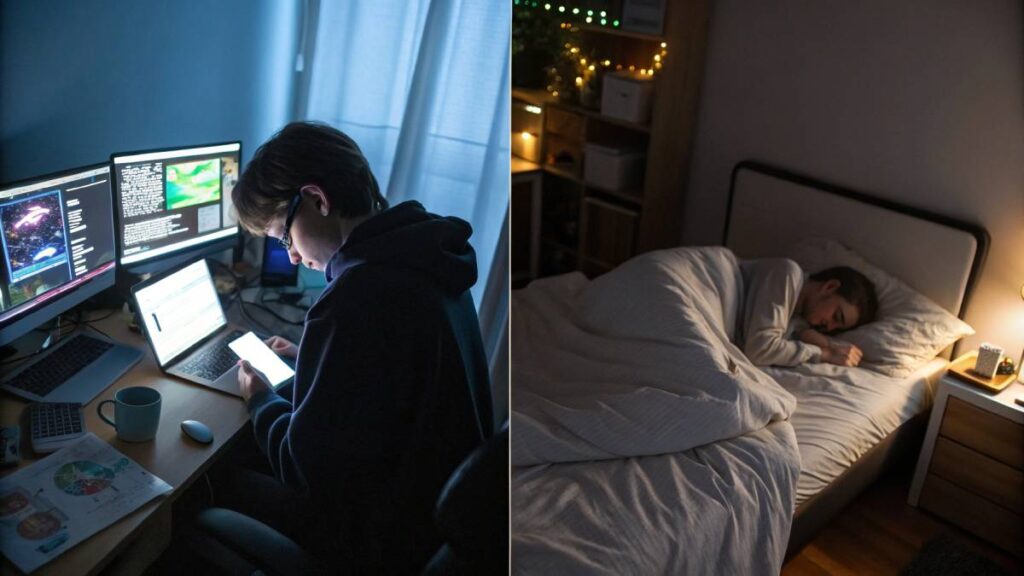
Then there are the wearable sleep gear and home sleep EEG gadgets. They show you the nitty-gritty of your sleep phases, helping you tweak your habits. With this tech on your side, you’re on your way to sleeping like a log.
Whether you’re into gadgets, juggling kids, climbing the career ladder, or hitting the gym, there’s a tech fix for everyone. By weaving AI sleep tools into your life, you’re not just stealing back your sleep—you’re making it count. Check out more on sleep tracking technology if you want the full scoop.
Let’s face it: tech isn’t going away anytime soon, and nor is the need for good sleep. But with a little help from AI, those two can live in harmony. Sweet dreams await!
Introduction to AI Sleep Optimization
Understanding AI Sleep Optimization Technology
AI sleep optimization uses the wizardry of artificial intelligence to boost your snooze quality by dishing out tailored sleep insights and tips. It’s like having a digital sleep coach that digs into heaps of snooze data from your trusty gadgets – fitbits, sleep-tracking apps, you name it – to decode your unique sleep style.
This tech wizard comes armed with smart algorithms decoding how long you sleep, your various sleep stages, and even the bumps in the night that wake you up. It’s personal, not one-size-fits-all, because everyone’s sleep story is different.
What to look for:
- Customized Sleep Plans: Think of it as a tailored schedule built just for your sleep habits.
- On-the-Spot Monitoring: It keeps an eye on your sleep patterns like a hawk.
- Smart Predictions: It spots trouble before it messes with your Z’s.
How AI Sleep Optimization Works
Here’s how this nifty tech gets you catching more quality Z’s:
- Scooping Up Data: It gathers intel from your sleep tech pals: wearable devices, at-home EEG gizmos, and all kinds of smart gadgets.
- Breaking It Down: These AI brainiacs sift through the data to spot patterns and oddities. That means tracking your REM cycles, tossing, turning, and even vital signs like heartbeats and how you’re breathing.
- Sleep Smarts for You: Post-analysis, the AI doles out pointers to fine-tune your sleeping habits. It might suggest tweaks to your bedtime rituals, setting the perfect bedroom ambiance, or lifestyle changes you didn’t know you needed.
- Tweaks in Real-Time: The AI takes action, like adjusting circadian lights to mimic the sun, or tweaking your smart mattress settings for your sleep’s sweet spot.
| Gadget | Job |
|---|---|
| Wearables | Keep tabs on your sleep story: how long, how deep, and any hiccups |
| Home Gadgets | Tweak the sleep vibe as per AI tips |
| Sleepy Apps | Show you the ropes, track your zzzs, and hand out advice |
| Bio Monitors | Keep an ear on your heartbeat, breath, and other body whispers |
With AI sleep optimization, you could be having better sleep dreams and cruising through the day like a pro. It’s made for all kinds of folks, from fitness buffs to career warriors needing extra REM.
Want to know more about how AI is changing your dream world? Peek at our tips on the top sleep apps and cool alarm clocks.
Benefits of AI Sleep Optimization
AI sleep optimization is like having a sleep coach in your pocket, working round-the-clock to make sure you catch those Zs like a pro. It does everything from dishing out sleep tips that fit you, peeping at how you toss and turn, to tweaking things in your snooze zone for a dreamy night.
“AI-powered sleep technology represents the most significant advancement in sleep medicine since the discovery of REM sleep. It’s transforming how we understand and optimize individual sleep patterns.” — Dr. Matthew Walker, Neuroscientist and Sleep Expert
Personalized Sleep Recommendations
Forget one-size-fits-all advice. AI sprinkles customized sleep wisdom based on your own habits. It pulls in data from gadgets like wristbands, apps, even smart beds, serving up suggestions that’ll help you snooze like a log and wake up on the right side of the bed.
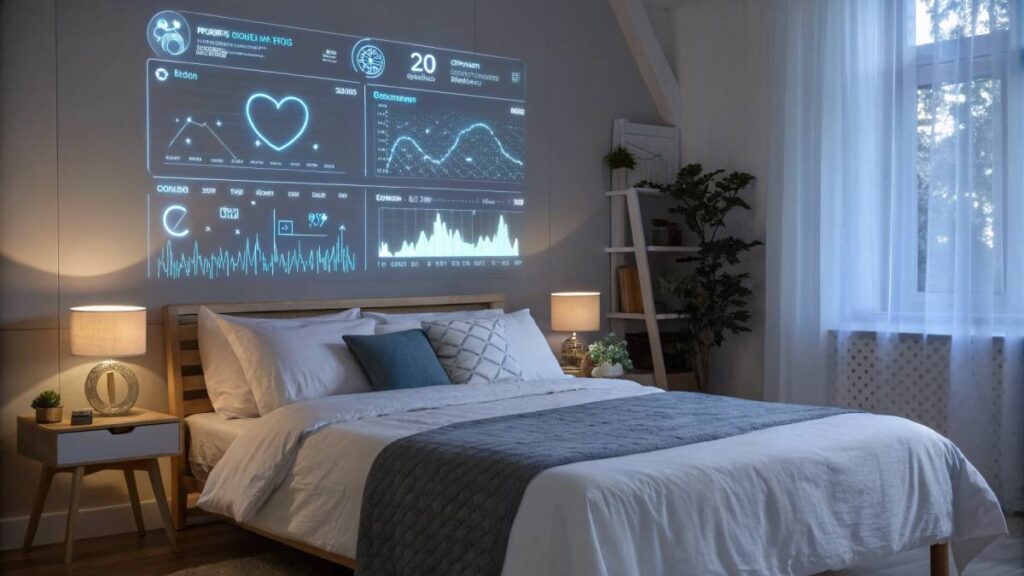
AI might suggest:
- Bedtimes and rise-and-shine moments that work for you
- Room settings like temperature and light that don’t mess with your sleep mojo
- Comfy positions for your most peaceful slumber
These little nuggets of wisdom help build a sleep haven just for you. For more tips on setting up your perfect sleep nest, wander over to smart home sleep optimization.
Tracking and Analyzing Sleep Patterns
AI doesn’t just peek; it watches your sleep like a hawk. It collects info from your sleep gear and offers an x-ray vision of how you sleep, including:
- How long you doze
- What stage you’re in (light, deep, REM)
- Times you pop up during the night
| Sleep Aspect | Why it Matters |
|---|---|
| Sleep Duration | Keeps you well-rested |
| Sleep Stages | Ensures each part of the sleep cycle gets its turn |
| Sleep Interruptions | Spots the culprits behind restless nights |
These reports let you spy on your own sleep habits, paving the way to make choices that bump up your sleep game. To dive deeper into the tech that spies on your sleep for you, have a nosey at our piece on sleep tracking technology.
Adaptive Adjustments for Better Sleep
AI’s smarts don’t stop at advice; it also fine-tunes your sleep scene on the fly. Using feedback from how you sleep, it can shake up its recommendations to keep your sleep smooth and uninterrupted. Adjustments can include:
- Using circadian lighting technology to shift light based on your body’s needs
- Tuning your smart bed to just the right settings
- Spinning calming tunes via noise-cancelling sleep devices
These adaptive tweaks mean that your sleep setup is always up to speed with what you need. If kicking back with some tech sounds like a plan, check out VR for sleep relaxation.
By tapping into AI sleep smarts, you’re not just dreaming of custom sleep advice, deep dive sleep checks, and live-action improvements—you’re living it, and it’s like a sleep renaissance every night.
AI Sleep Optimization for Different Audiences
AI sleep optimization has got a little something for everyone looking to snooze better and live healthier. Let’s see how different folks can use this tech to up their sleep game.
Tech Enthusiasts and AI Sleep Gadgets
Techies are often first in line for shiny new gizmos, right? AI sleep optimization is like a dream come true for them. It’s all about weaving these tech marvels into daily life to get a good night’s sleep. Fancy AI-powered sleep trackers and wearables keep you in the loop about your sleep habits.
Plus, with a little smart home magic, they can sync these sleep tools up with other devices for a top-notch sleep routine. Curious about how your smart home can help you catch some Zs? Check out our article on smart home sleep optimization.
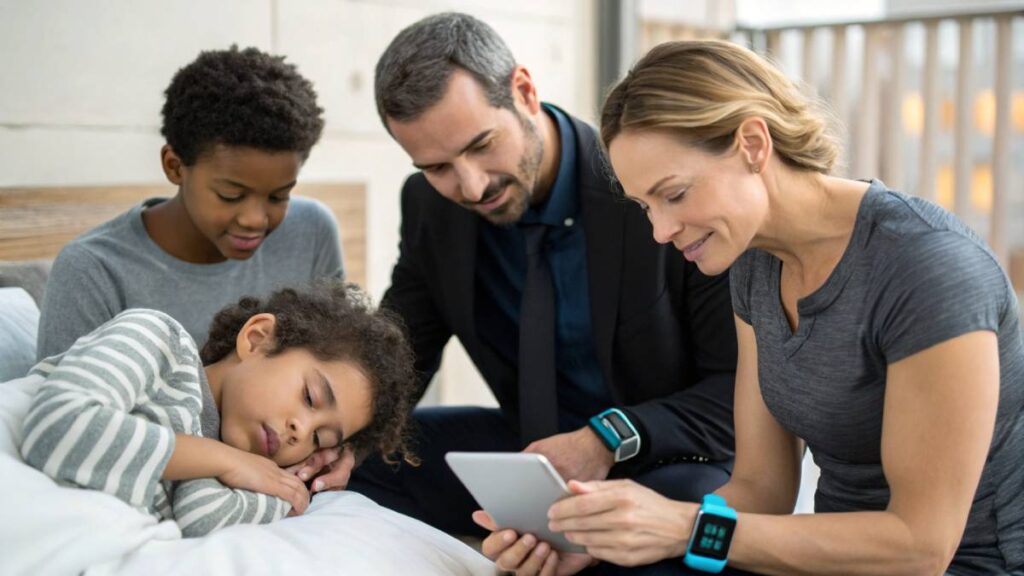
Helping Parents Put Kids to Slumber
Raising kids and getting them to sleep? Now there’s a combo parents know too well. AI sleep helpers can save the day (or night). With AI-driven sleep apps and monitors, folks can peek into bedtime rituals, how long the kiddos actually sleep, and what might be waking them up.
Personalized tips from AI tools can guide parents in setting up just the right sleep atmosphere for their munchkins. Need more ideas? Read about it in our smartphone sleep mode piece.
Professionals Getting Sleep Back on Track
Those with demanding jobs often fight with sleep troubles due to stress and packed schedules. Enter: AI sleep optimization. It’s like having a sleep coach analyzing patterns and suggesting tweaks for better rest.
From smart alarm clocks to nifty sleep tracking apps, professionals can rise and shine at the perfect time, ready to tackle the day. Find out how these gadgets help by checking our sleep tracking technology article.
Sleep Disorder Sufferers Finding Comfort
When sleep disorders like insomnia or sleep apnea turn nights upside down, AI sleep tools can be a lifeline. These gadgets track sleep cycles and flag signs of issues, making it easier for healthcare pros to whip up an effective treatment plan.
Try out AI solutions like home sleep EEG devices and noise-cancelling sleep devices to create a cozier sleep setting and ease those pesky symptoms.
| Sleep Disorder | AI Solution | Benefits |
|---|---|---|
| Insomnia | Sleep tracking apps | Finds patterns and reasons for poor sleep |
| Sleep Apnea | Home sleep EEG devices | Tracks breathing and flags any issues |
| Restless Leg Syndrome | Noise-cancelling devices | Cuts down on disturbances |
Fitness Buffs Using AI for Better Rest
Fitness lovers know that good sleep fuels their passion. AI sleep optimization gives them a wealth of data on how their sleep ties into their workout results. Using tools like the smart mattress benefits, they can perfect rest and recovery.
These gadgets can track everything from how well they’re sleeping to their body movements, giving a full report on sleep health. Want more info on fitness and sleep? Head over to our sleep tracker accuracy comparison article.
AI sleep optimization is the ticket to dreamland for all these folks, helping them wake up refreshed and ready to conquer the day.
Main Tips for Optimizing Sleep with AI Technology
- Start with tracking before changing habits – Allow your AI sleep system to collect at least 7-10 days of data before making significant changes to your routine.
- Integrate multiple data sources – Combine wearable data with environmental sensors for the most comprehensive sleep analysis.
- Consistency is key – Use your sleep technology consistently, even on weekends, to establish accurate baselines and trends.
- Customize sensitivity settings – Adjust the sensitivity of sleep tracking devices based on your specific sleep patterns and bed environment.
- Compare subjective and objective data – Regularly compare how you feel with what your devices report to calibrate and better understand your personal sleep needs.
- Start small with environmental changes – Implement one AI-recommended environmental change at a time to identify which factors most impact your sleep quality.
- Use technology-free time before bed – Even with sleep tech, maintain a 30-60 minute device-free period before sleep (except for your passive sleep tracking devices).
- Update software regularly – Keep all sleep technology firmware and apps updated to benefit from algorithm improvements and new features.
- Export and review long-term data – Periodically review months of sleep data to identify seasonal patterns and long-term trends.
- Combine AI recommendations with professional advice – For persistent sleep issues, share your AI-collected sleep data with healthcare providers for more comprehensive treatment.
Conclusion
The fusion of artificial intelligence and sleep science marks a transformative milestone in our quest for better health and well-being. As our digital lives continue to intensify, AI sleep optimization emerges as not just a technological novelty, but an essential tool for reclaiming our most fundamental biological need. Through personalized recommendations, meticulous pattern analysis, and adaptive environmental adjustments, this technology bridges the gap between our tech-saturated lifestyles and our biological requirement for restorative sleep.
What makes AI sleep optimization truly revolutionary is its democratic approach—offering solutions for diverse populations from tech enthusiasts exploring the latest gadgets to parents seeking better sleep for their families, professionals battling stress-induced insomnia, individuals coping with sleep disorders, and fitness enthusiasts optimizing recovery. Each solution is uniquely tailored to address specific needs while delivering the universal benefit of improved sleep quality.
The data-driven approach of AI sleep technology represents a paradigm shift from generic sleep advice to precision sleep medicine. By continuously analyzing individual sleep patterns—monitoring everything from sleep duration and stages to environmental factors and physiological responses—these systems create a comprehensive picture of your unique sleep profile. This detailed understanding enables real-time adaptations and long-term strategy development that evolve alongside your changing needs.
As we look to the future, the integration of AI sleep optimization into our daily routines promises not just better nights but better lives—with improved cognitive function, emotional regulation, physical performance, and overall health outcomes. The technology that once disrupted our sleep now stands as our most powerful ally in protecting it. Sweet dreams aren’t just possible; with AI, they’re programmable.
FAQs
What is AI sleep optimization technology?
AI sleep optimization technology uses artificial intelligence to analyze your unique sleep patterns through data collected from wearables, apps, and smart home devices. It then generates personalized recommendations to improve your sleep quality and makes real-time adjustments to your sleep environment for optimal rest.
How accurate are AI sleep tracking devices?
Most consumer-grade AI sleep tracking devices are reasonably accurate for tracking sleep duration and detecting significant disruptions. However, for precise sleep stage analysis (REM, deep sleep, etc.), home EEG devices provide the most accurate measurements, approaching the accuracy of clinical sleep labs for certain parameters.
Can AI sleep technology help with insomnia?
Yes, AI sleep technology can help address insomnia by identifying triggers and patterns that contribute to sleep difficulties. The technology provides personalized recommendations for improving sleep hygiene, suggests optimal bedtimes based on your circadian rhythm, and can create ideal environmental conditions through smart home integration. For chronic insomnia, these tools work best when used in conjunction with professional medical advice.
Do I need expensive equipment to benefit from AI sleep optimization?
No, you don’t necessarily need expensive equipment. While comprehensive smart home systems offer the most benefits, you can start with affordable sleep tracking apps that use your smartphone’s sensors or basic wearable fitness trackers with sleep monitoring features. As you become more invested in sleep optimization, you can gradually add more sophisticated devices.
How long does it take to see improvements from using AI sleep technology?
Most users begin to notice improvements in their sleep quality within 1-2 weeks of consistently using AI sleep optimization tools and following the personalized recommendations. However, the timeline varies based on individual factors such as existing sleep habits, sleep disorders, and how comprehensively you implement the suggested changes. The AI systems become more accurate and helpful the longer you use them, as they collect more data about your unique sleep patterns.
Is AI sleep technology safe for children?
Most AI sleep technology is designed for adults, but certain products are specifically developed for monitoring and improving children’s sleep. These child-friendly options focus on age-appropriate sleep metrics and recommendations. Always check age recommendations for specific devices and consult with a pediatrician before using sleep technology with children, especially for very young children.
Additional Resources
- National Sleep Foundation – Comprehensive resource for understanding sleep health and the latest research
- Sleep Research Society – Leading professional organization dedicated to sleep and circadian science
- American Academy of Sleep Medicine – Professional society for sleep medicine physicians and researchers
- Harvard Medical School Division of Sleep Medicine – Educational resources on sleep health from a top medical institution
- CDC Sleep and Sleep Disorders – Government resource on sleep health and public health initiatives
Product Recommendations
Smart Wearables for Sleep Tracking
- Oura Ring Generation 3 – The ultimate sleep tracking ring with comprehensive metrics and minimalist design. Perfect for those who find wristbands uncomfortable during sleep. (Get yours today to transform your sleep understanding!)
- Whoop 4.0 Fitness & Sleep Tracker – Subscription-based comprehensive sleep and recovery tracker favored by athletes and fitness enthusiasts. (Unlock your sleep potential with continuous monitoring!)
- Fitbit Sense 2 Advanced Health Smartwatch – All-in-one health smartwatch with detailed sleep stage tracking and daily readiness score. (Start your journey to better sleep tonight!)
Smart Bedroom Devices
- Eight Sleep Pod Cover – Dual-zone temperature regulation mattress cover with AI that adjusts throughout the night based on your sleep phases. (Experience the future of sleep optimization!)
- Philips SmartSleep Connected Sleep and Wake-up Light – Smart alarm with sunrise simulation and sleep environment monitoring. (Wake naturally and track your sleep environment with one elegant device!)
- Withings Sleep – Sleep Tracking Pad – Under-mattress sleep tracker that monitors sleep cycles, heart rate, and snoring without requiring you to wear anything. (Just sleep and let the advanced sensors do all the work!)
Sleep Apps with Premium Features
- Sleep Cycle Premium Subscription – Advanced sleep analysis app with smart alarm clock features and detailed analytics. (Upgrade your sleep insights with premium features today!)
- Calm Premium Subscription – Meditation and sleep stories app to help you fall asleep faster and stay asleep longer. (Transform your bedtime routine with premium sleep content!)
Sleep Environment Enhancers
- LEVOIT Smart Air Purifier – AI-controlled air purifier that automatically adjusts based on air quality to improve sleep breathing. (Breathe cleaner for better sleep every night!)
- Echo Dot with Alexa and Sleep Sounds – Smart speaker that integrates with sleep apps and can control your entire smart sleep environment. (Control your entire sleep sanctuary with simple voice commands!)
- Hatch Restore 2 Sound Machine & Sunrise Alarm – Customizable sound machine and sunrise alarm with guided sleep routines. (Program your perfect sleep and wake routine today!)
- Dyson Purifier Hot+Cool Formaldehyde HP09 – Multi-functional device that purifies, heats, and cools your sleep environment while connecting to sleep apps. (Maintain the perfect sleep temperature and air quality year-round!)

